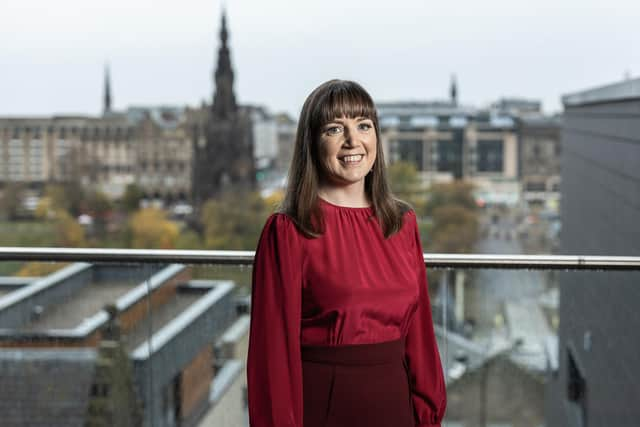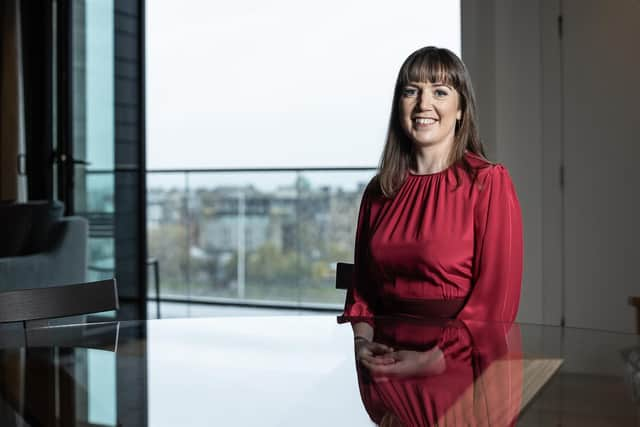The Big Interview: Gillian Ogilvie, managing director for Edinburgh at Will Rudd Davidson
and live on Freeview channel 276
She started with the firm as a project engineer in 2005, having previously worked as both a contractor and a consultant all over the UK, was appointed a WRD director in 2015, and promoted to her current post last year.
The businesswoman has dual civil and structural chartered engineer status, and flags a particular interest in conservation engineering – having worked on the Usher Hall Extension, the Edinburgh Futures Institute development at Quartermile, and the Edinburgh Printmakers development, for example. "I am committed to building and developing the Edinburgh side of the business,” she says.
Advertisement
Hide AdAdvertisement
Hide AdThe firm, which was established in 1982, also has an office in Glasgow – with more than 80 staff in Scotland altogether – and recently launched a presence in Dublin, Ireland, that it says will see the creation of eight roles in the coming year.


You took the reins in Edinburgh at WRD a year ago, an interesting period to do so! How has the first year progressed and what do you aim to achieve in the role long term?
Not many people would choose to take over a business during a global pandemic, but this had been planned for some time. It was certainly challenging but I think in some ways a great time to start as we were changing the way we worked and this brought new opportunities. I bring a new approach and viewpoint and the team has embraced the changes wholeheartedly.
The business has continued to grow during my first year at the helm and we are very positive about the future. We have added to the team over the last few months and are still recruiting to expand the expertise to match our pipeline of work.
Advertisement
Hide AdAdvertisement
Hide AdI’m passionate about investing in and developing people's skills and careers, in the same way I did coming through the ranks. It’s a win-win as we have employees that have been with us for many years and the directors at WRD in Edinburgh have all worked their way up through the practice. I’m keen to continue that under my tenure.


How has the pandemic altered your operations, both positively and negatively?
Our fundamentals of what we do have not changed measurably but how we deliver them has changed completely. We embraced remote working – this has been successful and has delivered efficiencies in some areas. Changes including paperless working and video meetings have also helped to reduce our carbon footprint.
There are real benefits to the staff and the operations in continuing to work at home; however, we are mindful of the potential for isolation, feeling less connected, and the impact on mental health and wellbeing. That is why we are targeting a hybrid approach, offering the best of both home and office working.
Advertisement
Hide AdAdvertisement
Hide AdYou have personally led key local projects, including the Usher Hall, while the firm is also involved in the Edinburgh Futures Institute, and has been working on some schools contracts. Could you summarise how the firm has been progressing in the city, and the outlook? What about the picture for Scotland more broadly?
Edinburgh has so much to offer as a city in terms of business, academia and community. The work we have done at both the Usher Hall and continue to do at the Edinburgh Futures Institute helps to ensure the city is at the forefront of business and education, offering world-class modern and flexible facilities.
Delivering work on projects that benefit communities is incredibly important to us, such as the work we have been doing with the City of Edinburgh Council on their schools programme. We have delivered three new primary schools and worked on various existing school estates to improve facilities for communities.
One recently completed project is St Crispin’s School, which includes a community hub for after-school, weekend and holiday activities.
Advertisement
Hide AdAdvertisement
Hide AdMore broadly, I think there is real optimism and a will to move forward positively and we are seeing this in the volume and scale of projects across Scotland. We have a healthy pipeline of work, including developments in the Highlands and across the Aberdeenshire region.
WRD has acknowledged that engineering of the built environment may not be viewed as the "greenest” industry, but the firm has signed the UK Structural Engineers Declare Climate and Biodiversity Emergency pledge, for example. Can you explain how the firm is looking to become more eco-friendly/sustainable, also in the wake of COP26 having taken place?
Sustainability has been at the heart of our work for some time, so signing the pledge was a natural next step for us. I personally was inspired by the presidential address that Rachel Skinner gave when she took over the Institution of Civil Engineers (ICE) presidency in 2020, just days after I started in my new role.
Professional institutions such as the ICE but also the IStructE have been instrumental in helping us develop our sustainability offering and we can now assess at early stages the relative carbon footprints of different construction types.
Advertisement
Hide AdAdvertisement
Hide AdThis is so fundamental in making informed decisions about material and construction type at a stage of the project where it can be easily accommodated. For too long sustainability has been brought up too late in the design process for it to be easily included in the fundamentals of the projects.
We are also developing new ways of delivering construction projects and have recently delivered modular timber study rooms using off-site fabrication, and tapping into sustainable sources.
What attracted you into engineering and can you summarise your career leading up to your current role?
I have always loved making things and being practical. At school, I studied maths and physics and it was my dad who suggested engineering. He was an accountant but both he and my grandfather were also very practical and enjoyed constructing small projects themselves.
Advertisement
Hide AdAdvertisement
Hide AdI didn’t relish the idea of doing a job where I would be sitting at a desk all day – I much prefer being out and about in the thick of things. After studying at the University of Newcastle I secured a job on site with a main contractor in London where I spent two years as a setting out engineer. It gave me a great grounding in how a building is physically put together, how important it is to get the design right and buildable, and great respect for the people out there physically toiling to build what we design.
From there I moved to a multinational consultancy working on incredible multi-million-pound projects including Terminal 5 at Heathrow and the Sage Gateshead music centre. I am still very proud every time I travel through Heathrow to know that I contributed to it. Those high-profile projects gave me a great taste for what was achievable but ultimately little contact with the wider design team.
The move to WRD allowed me to get much more involved in the wider aspects of projects.
You are a keen advocate for improving diversity in engineering and investing in the future workforce – and have highlighted initiatives like Women in Property. Can you give more details on what you’re doing to help improve diversity and inclusion, the importance of having a workforce with varied backgrounds, and what more should be done across the industry?
Advertisement
Hide AdAdvertisement
Hide AdI believe in the strength of diversity in the workforce. I see all the time that a range of opinions and outlooks builds a stronger team. I am a great fan of Women in Property and early on in my career, their networking events were fantastic for meeting people with whom I’m still in touch and who have helped me immeasurably to develop in my career.
Nicola Barclay at Homes for Scotland has been a real inspiration for what is achievable, especially as a woman in construction.
To encourage greater diversity I think we need to start earlier – in schools where we can educate young people on the variety of opportunities in the built environment. We need to challenge the traditional, outdated perceptions of working in the industry.
Young people need to see positive role models – people like Rachel Skinner and Roma Agrawal – who have both held prominent roles in the industry. They need to know that it is a welcoming sector that offers opportunities to carve out rewarding careers that can help benefit society.
Advertisement
Hide AdAdvertisement
Hide AdNext year WRD will turn 40 – what would you like the business to look like at that point?
I’m very proud to be at the helm of WRD in Edinburgh as we approach this anniversary, and I am very excited for what the future holds. The business is growing and we are delivering some incredible projects that will have a positive impact on society.
Projects like the Edinburgh Futures Institute that will educate and shape future generations, and also currently on our drawing boards is a project that will deliver more than 1,000 much-needed affordable homes. I am looking forward to celebrating this milestone event with the staff and our clients and continuing to grow the business as we move out of the pandemic and into brighter days.
A message from the Editor:
Thank you for reading this article. We're more reliant on your support than ever as the shift in consumer habits brought about by coronavirus impacts our advertisers.
If you haven't already, please consider supporting our trusted, fact-checked journalism by taking out a digital subscription.
Comment Guidelines
National World encourages reader discussion on our stories. User feedback, insights and back-and-forth exchanges add a rich layer of context to reporting. Please review our Community Guidelines before commenting.
